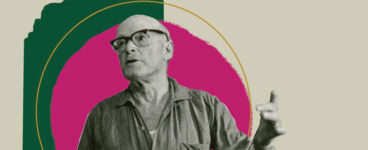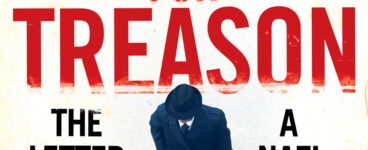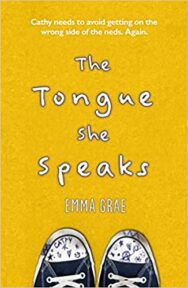‘I also hope that readers see the battles Scots speakers face and the courage that it takes to create in the leid.’
Fifteen-year-old Cathy O’Kelly lives in an insular world – she’s been bullied, home schooled, and is now going to high school, dreaming of getting the marks she needs to be a proper Scots writer. This time, her bully isn’t in a tracksuit, but an aspiring poet. Emma speaks to Books from Scotland about her new book, and the importance of fostering the Scots language, both on the page and beyond.
The Tongue She Speaks
By Emma Grae
Published by Luath Press
Can you tell us a little bit of what we can expect from The Tongue She Speaks?
The Tongue She Speaks is a book about the Scots language itself, told in Scots. It’s about the barriers Scots speakers face and how this plays out across the generations. It’s also about dreams, music and very much an ode to the emo culture of the early noughties, which was thriving in Glasgow at the time. If you’ve seen Almost Famous, it’s a bit like that, but on a much more intimate stage.
What drew you to 2007 Glasgow and the emo and punk scenes as a backdrop for your story? What is it about that time / place?
During lockdown, I really started to long for a simpler time and that was when I was a teenager. I also found myself watching a lot of YouTube blogs about Y2K nostalgia and had it in my head when I was working on the Scots Warks project – designed to encourage Scots literacy. As part of that, I had to write a creative piece to inspire people to take up the lead, and it’s where the book began. With Scots and nostalgia in mind, it actually got to the point where I was watching videos of my old high school, which was knocked down well over a decade ago. Just imagining the early days of the internet, back when people lived in the real world a bit more, and online was just this dangerous, slightly bizarre new world that everyone was navigating for the first time.
Scots Warks project: https://www.scotslanguage.com/scots-warks
‘Scots is a language. It’s no jist fur poor folk and those who cannae speak English properly’ marks the start of your blurb – can you tell us a little about writing in Scots, and the attitudes touched on in this quote in regards to the legitimacy of Scots?
Despite being very much a proud Scots writer these days, there was a time when I was ashamed of being a Scots speaker – largely as I’d no idea that it was a language and it felt like everyone around me was telling me not to speak it – that it was just bad English. It was only about a decade ago, while studying English in Glasgow, that my good friend and I drunkenly started joking in Scots, and we’ve honestly never looked back. Her name is Lorna Wallace and she’s had huge success with Scots too, which began with a viral poem that was a modern rendition of To a Mouse – Tae a Selfie!
The book explores this further, with Cathy wanting to be a writer, and her bully an aspiring poet – how did you find exploring these tensions while writing about being a writer?
I guess I found it quite easy because it was very much a reflection of my own life in a lot of ways. Like Cathy, I felt the pressure to be something I wasn’t, but it took me a lot longer to find my voice. I spent years to pretending to be everyone but myself. It was only when Chris Agee, a poet who was in residence at Strathclyde University, saw value in my own stories, which came in my own voice, that I started to use it. I’ll always be grateful to him for that. It’s really been a simple case of write what you know.
Your previous book Be guid tae yer Mammy won the Scots Book of the Year for 2022 (congratulations!); continuing from the previous question, why do you feel it’s important we continue to spotlight the thriving work in Scots in its own distinct awards and support such as funding?
I think there’s a distinct lack of Scots voices out there, especially female ones. When we think of well-known Scots writers, it’s typically not women who (currently) come to mind, but I hope it changes and we hear from people of all genders and sexualities.
Fundamentally, Scots is also the mother tongue of 1.5 million people. It’s what I grew up speaking, and it comes so much more naturally to me than English. It feels authentic, and as my work is set in my home city and deals with a lot of lived experience of mental illness, I can’t think of a better way to tell my stories.
Who or what inspires your own work?
My own life – history, art, music. When I was younger, I was really drawn to F. Scott Fitzgerald’s work. He captured what it meant to live in the Jazz Age and I guess I’m trying to do similar, to capture a sense of what it’s like to live now, in my own voice. Even if my work is a total world away from the likes of The Great Gatsby.
Another huge inspiration to me is David Bowie. He said in an interview about twenty years ago that all of his work is about social isolation and rebellion and that really resonated with me.
I also take a lot of inspiration from family members who’re long gone, and all of the poetry from Cathy’s Great Grandfather in The Tongue She Speaks was actually written by my Great Grandfather. I have photograph upon photograph from that time, and I imagine there’s more stories I’ll eventually take from those heirlooms.
What do you hope readers take from The Tongue She Speaks?
I hope that readers see the nuances of PTSD, which Cathy is clearly suffering from. I want people to walk away with a realisation too that bad people don’t always look like monsters – they can be girls on trains pretending to use their God for good, when it’s really bad, and friends who tear others down, then follow it up with intermittent praise (fun fact – it’s called trauma bonding!).
I also hope that readers see the battles Scots speakers face and the courage that it takes to create in the leid. While I wish people could just freely write and use Scots, it’s not currently the case (especially online…), but I hope that changes one day.
The Tongue She Speaks by Emma Grae is published by Luath Press, priced £9.99.
ALSO IN THIS ISSUE

 Doras Gun Chlàimhean
Doras Gun Chlàimhean
I did not ever think That you would come home, my love, In a narrow, wooden coffin.

 A Taste for Treason
A Taste for Treason
Daredevil pilot, wartime fighter ace and ‘resting’ actor Major Christopher Draper told reporters on …













